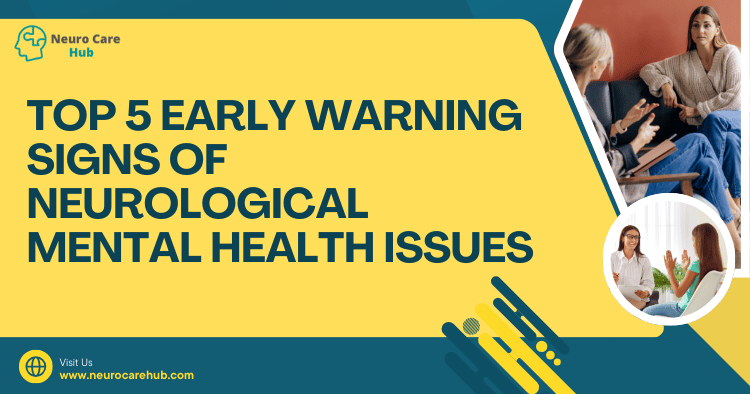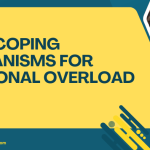Introduction
Neurological disorders often intersect with mental health issues, leading to a complex web of symptoms. Understanding the early warning signs can help in seeking timely intervention and improving overall well-being. In this blog, we’ll explore the Top 5 Early Warning Signs of Neurological-Induced Mental Health Issues. By identifying these signs early, you can take proactive steps toward seeking help and managing your health effectively.
“Awareness is the first step toward change.”
1. Frequent Headaches
Headaches are a common complaint, but when they become recurrent or severe, they may signal underlying neurological issues. According to the American Migraine Foundation, conditions like migraines can be linked to neurological health.
What to Look For:
- Intensity: Are your headaches more severe than usual?
- Duration: Do they last longer than typical headaches?
- Associated Symptoms: Are you experiencing nausea, visual disturbances, or sensitivity to light?
If headaches are frequent and disruptive, it’s important to consult a healthcare professional. Early intervention can prevent complications and improve your quality of life.
“Headaches can be more than just a nuisance; they may signal something deeper.”
2. Memory Loss
Experiencing occasional forgetfulness is normal, particularly with stress or fatigue. However, persistent memory loss can be a sign of neurological decline. Conditions such as Alzheimer’s disease or other dementias can manifest through early memory issues.
Signs of Concern:
- Short-Term Memory Loss: Forgetting recent conversations or events.
- Difficulty Remembering Names: Struggling to recall names of familiar people.
- Misplacing Items: Frequently misplacing items in unusual places.
If you notice a pattern of memory problems, consult a neurologist for a thorough evaluation. Early diagnosis can help manage symptoms more effectively. The Alzheimer’s Association provides valuable resources and support for those experiencing memory-related issues.
“Memory loss is not just a part of aging; it can be a signal for something more serious.”
3. Mood Swings
Sudden and extreme changes in mood may indicate underlying neurological conditions. These fluctuations can be linked to various factors, including brain injuries or neurodegenerative diseases.
Indicators of Mood Changes:
- Irritability: Increased irritability or frustration over minor issues.
- Depression or Anxiety: Persistent feelings of sadness or anxiety that disrupt daily life.
- Emotional Outbursts: Experiencing uncontrolled emotional reactions.
If you notice these changes, it’s essential to seek help from a mental health professional. They can help determine if the mood swings are related to a neurological condition or other factors. For more insights on how mood disorders connect with neurological issues, check out our article on Top 5 Neurological Disorders Impacting Emotional Well-Being.
“Your emotions are a crucial part of your mental health; don’t ignore the signs.”
4. Changes in Sleep Patterns
Sleep disturbances can be a significant indicator of neurological issues. Conditions like sleep apnea, restless leg syndrome, or even depression can affect how well you sleep.
Signs to Monitor:
- Insomnia: Difficulty falling or staying asleep.
- Oversleeping: Sleeping excessively without feeling rested.
- Frequent Nightmares: Experiencing distressing dreams that interrupt sleep.
Improving sleep hygiene can help, but persistent issues should be evaluated by a healthcare provider. The National Sleep Foundation offers resources for improving sleep quality and understanding sleep disorders. For further reading on how sleep impacts mental health, visit Top 5 Ways Sleep Impacts Your Mental Health.
“Good sleep is not a luxury; it’s a necessity for mental health.”
5. Difficulty Concentrating
Struggling to concentrate or stay focused can be a sign of various neurological conditions, including ADHD, concussions, or cognitive decline.
Signs of Concentration Issues:
- Easily Distracted: Finding it hard to complete tasks due to distractions.
- Forgetfulness: Frequently losing track of what you were doing.
- Mental Fatigue: Feeling mentally exhausted after simple tasks.
If you’re experiencing concentration issues, it’s essential to discuss these symptoms with a healthcare professional. Cognitive assessments can help identify potential underlying conditions. For more information on cognitive health, refer to our article on Top 5 Tips for Choosing the Right Neurologist.
“Concentration challenges can be a cry for help from your brain.”
Conclusion
Recognizing the early warning signs of neurological-induced mental health issues can be vital in seeking timely assistance. If you or someone you know is experiencing these symptoms, don’t hesitate to reach out to a healthcare provider. Early intervention can lead to better outcomes and improved quality of life. For additional insights on neurological care, explore our resource on Top 5 Essential Insights on Neuro Care You Need to Know.
“Taking charge of your health is the best gift you can give yourself.”
FAQs
Q1: What should I do if I notice these symptoms in myself or someone else?
A1: It’s essential to consult a healthcare professional for a thorough evaluation. Early diagnosis can significantly impact treatment options.
Q2: Are there lifestyle changes that can help manage these symptoms?
A2: Yes! Regular exercise, a balanced diet, adequate sleep, and stress management techniques can improve overall neurological and mental health.
Q3: Where can I find more information on neurological health?
A3: Websites like the National Institute of Neurological Disorders and Stroke and the Alzheimer’s Association provide reliable information and resources.
“Knowledge is power—equip yourself with the information you need.”
Feel free to explore these resources and take proactive steps for your health!






